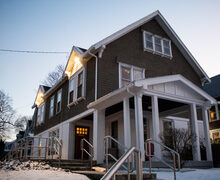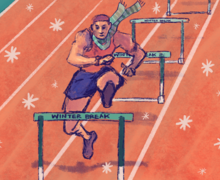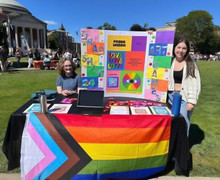Visiting less Westernized parts of Amman, Jordan proves valuable
The last few days of my weeklong break between classes due to Eid al-Adha was spent alternating between schoolwork and exploring a little more of Jordan.
After spending four rather touristy days on a private beach along the Jordanian seaside, I was ready to get back to experiencing the real Jordan — whatever one interprets that to be.
To me, that means pushing myself to do things like taking walks along the crowded, shop-filled streets near my house. Many of my program peers haven’t even explored their neighborhood, let alone gone to unfamiliar places around Amman, Jordan.
Everyone studying abroad should strive to discover and explore the city and country they live in, even if you feel that social norms might prevent you from doing so.
One way I got to know Amman a little better this week was when I was able to meet with my language partner. This program requirement helps my peers and I practice Arabic and learn more about the community while our partners have the chance to improve their English skills.
The first time I met my partner, she introduced me to her wonderfully noisy family and friends. Circassian by descent, she and all of her girlfriends spent a lot of time speaking in a very fast, joyful version of Jordanian Arabic.
After a meal of Mansaf, the national dish of Jordan made with meat, rice, almonds and a special yogurt sauce, we went on a drive outside of the city to the beautiful surrounding land around Amman.
Later that night, my entire extended host family took some of my friends, my roommate and I for a game of paintball in the city of Salt, Jordan. As we drove into Salt, the Jordan hills broke off into a cliff where we could see Palestine clearly on the other side.
I spent the next few days camped out in my favorite coffee shop down the street in order to do homework with access to strong Wi-Fi, a luxury I really only get at the AMIDEAST center.
As I have come to expect from my host family, we were invited to another family activity of football at a sports club in the suburbs of Amman. I didn’t realize how serious the game was until four of my host cousin’s friends, who all happened to be in professional football leagues, showed up.
In all of the traveling and exploring I did this week, I tried to steer clear of the parts of Amman that are known as the Western areas. Instead of spending the day on Rainbow Street, a street of high-end shops that cater to western tourists, I chose to go downtown where alleyways host street vendors — many locals do their own shopping here.
Little decisions like the ones I made this week are what make the experience of living in a different country richer. I find the sights, shops, people and even the smells to be special. Especially when the prices of the items in the stores don’t silently push locals with lower incomes away while simultaneously greeting westerners with their tourist dollars.
Being included as one of the few American students who study abroad in the Middle East is considered by some to be an accomplishment by itself. I, however, think a sense of accomplishment comes in observing and experiencing many different ways of life in the country you study in.
The ability to reflect on those experiences and being willing to share them with people back in your home country is what, in my mind, makes the study abroad experience come full circle.
Katelyn Faubel is a junior newspaper and online journalism and international relations dual major. Her column appears weekly in Pulp. You can email her at kmfaubel@syr.edu.
Published on September 19, 2016 at 6:48 pm






